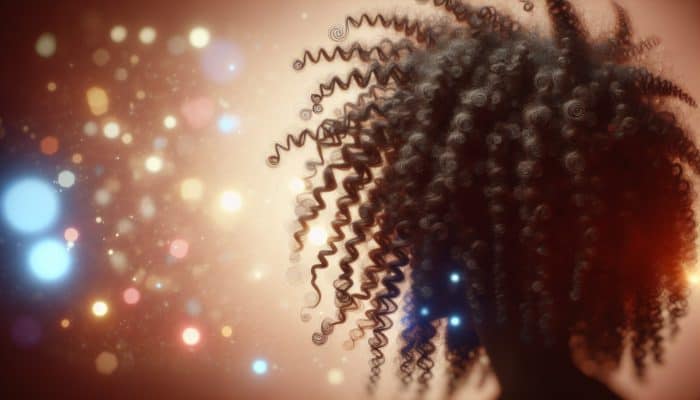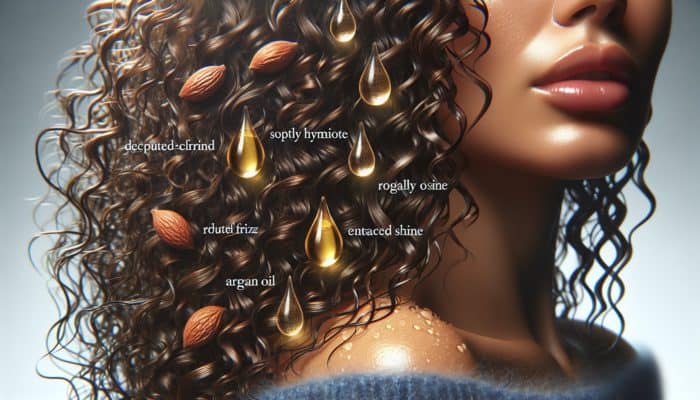Master Coily Hair Care Techniques for Stunning, Soft Locks
Understanding the Unique Traits of Coily Hair for Optimal Care

Coily hair is a beautiful and intricate texture, celebrated for its complex structure and tight curls or spirals. This distinctive hairstyle not only creates an eye-catching aesthetic but also reflects the unique personality of the wearer. However, despite its captivating beauty, coily hair can present specific challenges that require knowledgeable and attentive maintenance. This hair type tends to be particularly susceptible to dryness and frizz if not cared for properly. The tightly packed curls can hinder the natural oils from traveling down the hair shaft, leading to strands that may feel coarse and brittle. Thus, achieving the softness associated with healthy hair can be a significant challenge for individuals with coily hair textures.
To effectively care for coily hair, it is crucial to understand its scientific foundations. The nature of the curl pattern largely depends on the shape of the hair follicle; oval-shaped follicles typically produce curlier strands, while round follicles create straighter hair. This unique structure not only enhances the charm of coily hair but also complicates everyday maintenance routines. Recognising these essential factors is vital for anyone keen on learning how to treat coily hair for enhanced softness effectively.
Prioritising Hydration: The Key to Healthy Coily Hair
Hydration is the cornerstone of effective coily hair care; without sufficient moisture, the strands can quickly become dull and brittle. The hydration levels in coily hair are directly linked to its elasticity, a critical factor in reducing breakage and facilitating healthy hair growth. When deprived of moisture, coily hair can become increasingly fragile, leading to split ends and stunted growth. Thus, understanding the importance of hydration is essential for maintaining vibrant, healthy locks.
To achieve and sustain soft, healthy coily hair, it is essential to implement a thorough hydration strategy. This strategy should involve not only the use of hydrating products but also ensuring adequate internal hydration by consuming sufficient water daily. Numerous studies support the connection between water intake and hair vitality, highlighting that proper hydration significantly influences hair texture and overall health. For individuals eager to learn how to treat coily hair for improved softness, prioritising moisture retention can lead to remarkable transformations in both hair quality and appearance.
Identifying Your Hair Type for Tailored Care Solutions
Determining whether your coily hair falls into type 3 or type 4 is essential, as this classification can greatly influence your hydration approach. Type 3 hair typically features looser curls that maintain a defined pattern, while type 4 hair is characterised by tighter, more zigzag curls that often struggle with dryness. Recognising your specific hair type empowers you to select products and techniques tailored to effectively meet your unique needs.
For instance, individuals with type 4 hair may find richer creams and oils more beneficial in combating dryness, while those with type 3 hair might achieve better results with lighter gels and custards. Understanding these distinctions is crucial for anyone navigating the complexities of how to treat coily hair for enhanced softness. By personalising your hair care regimen, not only can you improve the texture of your hair, but you can also promote its overall health, resulting in a more manageable and vibrant appearance.
Choosing Hydrating Shampoos and Conditioners for Coily Hair

Selecting the Best Shampoo for Coily Hair Care
Choosing the right shampoo is fundamental to establishing an effective hair care routine, particularly for individuals with coily hair. It is advisable to select shampoos enriched with hydrating ingredients like aloe vera and glycerin, which are known for their gentle cleansing properties that do not strip the hair of its natural oils. Unlike conventional shampoos that often contain harsh sulfates, hydrating shampoos are specifically designed to maintain moisture levels while effectively cleansing away dirt and product buildup.
The choice of shampoo can significantly impact the success of your overall hair care regimen; a well-formulated hydrating shampoo lays the groundwork for achieving enhanced softness. For those eager to discover how to treat coily hair for optimal softness, selecting the right cleansing product is a critical step. Always remember to follow up with a conditioner that complements your shampoo, ensuring a comprehensive and effective hydration strategy that nurtures your coily hair.
Discovering the Benefits of Deep Conditioning Treatments
Deep conditioning treatments are an essential component of any coily hair care routine. These intensive treatments penetrate deeply into the hair shaft, replenishing lost moisture and revitalising the strands from within. The outcome is softer, more manageable coily hair that effectively battles frizz and dryness. Regular deep conditioning can also improve elasticity, which is crucial for preventing breakage and ensuring your hair maintains length.
Utilising a deep conditioner rich in hydrating ingredients, such as shea butter or coconut oil, can significantly enhance the texture of coily hair. The frequency of deep conditioning should be customised to your hair's specific needs—those with extremely dry or damaged hair may benefit from weekly treatments, while others might find bi-weekly applications sufficient. By incorporating deep conditioning into your hair care regimen, you can unlock the secrets of how to treat coily hair for enhanced softness, ultimately revealing its potential for vibrancy and health.
Utilising Leave-In Conditioners for Daily Moisture Retention

Leave-in conditioners are crucial for maintaining hydration throughout the day. These lightweight formulations are specifically designed for application after washing and can significantly reduce frizz while enhancing softness. They act as a protective barrier, providing ongoing moisture and nourishment to coily hair.
For individuals seeking to maximise hydration, a high-quality leave-in conditioner can be transformative. Look for products that contain beneficial ingredients such as jojoba oil or argan oil, both renowned for their exceptional moisturising properties. When paired with an appropriate styling routine, leave-in conditioners can help you achieve the desired softness and manageability that signify healthy coily hair. Understanding and implementing this vital aspect of care is essential to mastering how to treat coily hair for optimal softness.
Establishing a Consistent Hydration Routine for Coily Hair
Regular hydration through the use of shampoos and conditioners is crucial for the overall health of coily hair. Consistent application of hydrating products helps to prevent dryness and breakage, enhancing the hair's vibrancy and softness. Maintaining a reliable hydration routine not only aids in moisture retention but also significantly contributes to boosting the natural shine and softness of the hair.
To achieve optimal results, consider integrating a weekly or bi-weekly treatment focused on rejuvenating hydration. This could involve masks specifically formulated for coily hair or treatments enriched with nutrients that work synergistically with your existing regimen. Committing to consistent hydration practices can lead to remarkable improvements in the overall texture and manageability of coily hair, thus making your journey to mastering how to treat coily hair for enhanced softness much smoother.
Implementing Effective Moisturising Techniques for Coily Hair
Mastering the L.O.C. Method for Superior Moisture Retention
The L.O.C. method, which stands for Liquid, Oil, and Cream, is a highly efficient technique for locking in moisture in coily hair. This layering approach ensures that each product serves its specific function, ultimately resulting in softer, more hydrated strands. The initial step involves applying a liquid product—this could be water or a hydrating spray—to thoroughly saturate the hair. Following this, an oil is applied to seal in the moisture, and finally, a cream is used to add definition and hydration.
Utilising the L.O.C. method can yield significant benefits for those looking to enhance their understanding of how to treat coily hair for enhanced softness. Each step plays a vital role in ensuring moisture retention while effectively preventing frizz. The effectiveness of this method may vary based on individual hair types, so some experimentation may be necessary to discover the ideal combination that works best for you.
Incorporating Protective Styles for Healthier Coily Hair
Engaging in protective styling is an invaluable strategy for maintaining the health and integrity of coily hair. Styles such as braids, twists, and updos not only provide aesthetic appeal but also serve practical purposes. These styles protect the hair ends, which are often the most susceptible to damage and dryness. By retaining moisture within the strands, protective styles contribute to keeping coily hair soft and healthy.
Incorporating protective styles into your hair care routine can also reduce manipulation—an often overlooked cause of breakage in coily hair. Moreover, styles that tuck away the ends can be maintained for extended periods, allowing deep conditioning treatments to work effectively while ensuring the hair remains safeguarded. For anyone eager to learn how to treat coily hair for enhanced softness, adopting protective styles can be an effective strategy for achieving and maintaining that desirable softness.
The Significance of Regular Moisturising Practices for Coily Hair
Regularly applying a lightweight moisturiser can be a game-changer for coily hair. This daily routine helps combat the natural dryness that often accompanies coily textures. By integrating a light, hydrating product into your regimen, you can maintain softness throughout the day, effectively reducing frizz and promoting a more defined curl pattern.
Selecting the right type of moisturiser is vital—look for those formulated with hydrating components like aloe vera or glycerin. These nourishing ingredients not only provide essential moisture but also help lock in hydration without weighing down your curls. Implementing a daily moisturising routine can be a pivotal factor in successfully mastering how to treat coily hair for enhanced softness, leading to a more vibrant and healthy appearance.
Integrating Deep Conditioning Treatments into Your Hair Care Routine
Deep conditioning treatments should be considered a staple in the hair care regimen for coily hair. These intensive treatments penetrate the hair shaft, delivering a potent boost of moisture that can dramatically transform the hair’s texture. Regular deep conditioning can restore moisture levels, strengthen the hair, and enhance its natural softness and manageability.
Choosing the right deep conditioner is essential; look for products that are rich in natural oils and butters, such as shea butter or coconut oil, known for their nourishing properties. The frequency of deep conditioning should be tailored to your hair's condition—depending on its needs, treatments can be performed weekly or even more frequently. By committing to this practice, individuals can unlock the secrets of how to treat coily hair for enhanced softness, leading to healthier, more luxurious-looking hair.
Utilising Natural Oils and Butters for Optimal Coily Hair Care
Harnessing the Moisturising Benefits of Coconut Oil
Coconut oil is highly regarded for its impressive ability to penetrate the hair shaft, delivering intense hydration and reducing protein loss. This unique characteristic makes it especially beneficial for coily hair, which often faces challenges with moisture retention. Regular application of coconut oil not only hydrates the hair but also contributes to a softer texture, significantly improving overall manageability.
Additionally, coconut oil is packed with fatty acids, which can strengthen the hair and prevent breakage. Its antimicrobial properties also make it an excellent choice for maintaining a healthy scalp, promoting hair growth. Those looking to learn how to treat coily hair for enhanced softness will find coconut oil to be an invaluable addition to their hair care routine, offering transformative hydration and nourishment.
Embracing Shea Butter for Coily Hair Nourishment
Shea butter is a powerhouse ingredient known for its rich vitamin content and fatty acids that nourish and soften coily hair. This natural emollient excels at sealing in moisture and enhancing shine, making it a popular choice among individuals with coily textures. Its creamy consistency facilitates easy application, ensuring that every strand receives optimal hydration.
Incorporating shea butter into your hair care routine can lead to significant improvements in softness, as it penetrates deeply into the hair shaft while creating a protective barrier against environmental stressors. It also helps reduce frizz and improves curl definition, making it an ideal ally for anyone seeking to master how to treat coily hair for enhanced softness effectively.
Exploring Other Beneficial Oils for Coily Hair Care
Oils such as argan and jojoba also play a vital role in enhancing the softness of coily hair. Argan oil, often referred to as “liquid gold,” is celebrated for its high levels of antioxidants and essential fatty acids that nourish and repair damaged hair. Jojoba oil, which closely resembles the natural sebum produced by the scalp, serves as an excellent moisturiser that aids in moisture retention.
Incorporating these oils into your hair care routine can provide extra moisture and nourishment, resulting in improved softness and manageability. By diversifying the oils used, individuals can experiment with various combinations that best suit their unique hair type and needs, making substantial progress in their quest to learn how to treat coily hair for enhanced softness.
Discovering the Advantages of Olive Oil for Coily Hair
Olive oil is rich in antioxidants and vitamins, making it an excellent choice for moisturising and repairing damaged coily hair. Its lightweight nature allows it to penetrate the hair shaft effortlessly, providing hydration without leaving a greasy residue. This characteristic makes olive oil suitable for daily application, helping to maintain softness and prevent breakage.
In addition to its hydrating benefits, olive oil can also enhance the overall health of coily hair by nurturing the scalp and reducing inflammation. This comprehensive approach to hair care ensures that individuals focus not only on the strands but also on the health of the scalp. Those aiming to discover how to treat coily hair for enhanced softness should consider incorporating olive oil as a staple in their routine for optimal benefits.
Utilising Mango Butter for Enhanced Moisture Retention
Mango butter offers deep hydration and is rich in nutrients that promote healthy, soft coily hair. Renowned for its emollient properties, mango butter helps seal in moisture while enhancing the hair's natural shine. Its rich texture makes it perfect for deep conditioning treatments or as a leave-in product to maintain softness throughout the day.
Incorporating mango butter into your hair care regimen can lead to significant improvements in coily hair texture, making it an excellent choice for those looking to master the art of how to treat coily hair for enhanced softness. With regular use, you may experience not only enhanced softness but also improved overall hair health and vibrancy.
Avoiding Common Mistakes in Coily Hair Care
Recognising the Dangers of Over-Washing Coily Hair
One of the most common mistakes made by those with coily hair is over-washing their strands. Excessive washing can strip coily hair of its natural oils, resulting in excessive dryness and reduced softness. The unique structure of coily hair naturally inhibits moisture retention, making it essential to preserve the oils produced by the scalp.
To address this issue, it is recommended to wash coily hair no more than once or twice a week, depending on your lifestyle and the specific needs of your hair. When washing, always opt for a gentle, hydrating shampoo that cleanses without stripping essential moisture. Understanding the delicate balance between cleanliness and moisture retention is vital for effectively mastering how to treat coily hair for enhanced softness.
Avoiding Heat Damage for Healthier Coily Hair
Excessive use of heat styling tools can cause severe damage to coily hair, rendering it brittle and less soft. High temperatures strip away moisture and essential nutrients, causing the hair cuticles to lift and become porous. This results in increased frizz and decreased softness, which can be discouraging for those who love their coily locks.
To prevent heat damage, consider embracing your natural texture more frequently and limit the use of heat styling tools. When heat styling is necessary, always apply a high-quality heat protectant to shield your strands. Learning to embrace low-heat or heat-free styling options can significantly assist in your pursuit of how to treat coily hair for enhanced softness, allowing your natural beauty to shine.
Steering Clear of Harsh Chemicals in Hair Products
Harsh chemicals commonly found in many commercial hair products can wreak havoc on coily hair, stripping away moisture and leading to breakage. Ingredients such as sulfates and alcohol should be avoided, as they can disrupt the hair's natural moisture balance.
When selecting products, it is advisable to choose those specifically formulated for coily or curly hair, which are often free from harmful chemicals and enriched with hydrating ingredients. This mindful approach can significantly enhance your understanding of how to treat coily hair for enhanced softness, paving the way for healthier and more manageable hair.
The Intricate Relationship Between Diet and Hair Hydration
The Critical Role of Staying Hydrated for Healthy Hair
Internal hydration is just as essential as external treatments when it comes to maintaining the softness of coily hair. Adequate water consumption plays a foundational role in overall health, directly impacting hair quality. When the body is well-hydrated, this is reflected in the hair, resulting in softer and more resilient strands.
To ensure optimal hydration, aim to drink at least 2 litres of water daily, adjusting based on your activity levels and environmental conditions. By prioritising water intake, individuals can make significant progress towards mastering how to treat coily hair for enhanced softness, culminating in healthier and more vibrant locks.
Nutrients Essential for Promoting Hair Health
A diet rich in omega-3 fatty acids and vitamins A, C, and E can greatly enhance the softness and health of coily hair. These essential nutrients work synergistically to nourish hair follicles and improve moisture retention. Incorporating foods such as salmon, avocados, nuts, and leafy greens into your diet should be staples for anyone looking to improve their hair health.
Including a variety of colourful fruits and vegetables not only provides vital vitamins but also aids in overall bodily hydration. Recognising the crucial connection between diet and hair quality is essential for those wishing to learn how to treat coily hair for enhanced softness, highlighting the importance of a holistic approach to hair care.
Exploring the Potential of Supplements for Hair Vitality
While maintaining a balanced diet is crucial, supplements can also play a role in promoting healthy coily hair. For example, biotin is frequently recommended for improving hair thickness and strength. Additionally, omega-3 supplements can deliver extra hydration benefits, particularly for individuals who may find it challenging to obtain enough from their dietary sources.
Before starting any supplement regimen, it is advisable to consult with a healthcare professional to ensure it aligns with your health needs. By incorporating beneficial supplements, individuals can further enhance their understanding of how to treat coily hair for enhanced softness, paving the way for improved hair health.
Recognising the Impact of Dehydration on Hair Quality
A lack of proper hydration can lead to dry, brittle coily hair, significantly increasing the likelihood of breakage and dullness. When the body is dehydrated, it prioritises essential functions, often at the expense of hair quality. Understanding this connection underscores the importance of maintaining adequate hydration levels for overall hair vitality.
To combat the effects of dehydration, it is essential to integrate more hydrating foods into your diet, while also increasing your water intake. Acknowledging the detrimental impact of dehydration on hair can empower individuals to take proactive steps in their hair care journey, especially when striving to learn how to treat coily hair for enhanced softness.
Identifying Foods to Avoid for Optimal Hair Health
Processed foods and high sugar consumption can negatively affect the moisture and overall health of coily hair. These foods may lead to inflammation and reduced circulation, both of which can hinder hair growth and vitality. Instead, focus on whole, nutrient-dense foods that support hair health and hydration.
Opt for a diet rich in vibrant fruits, vegetables, and lean proteins, providing the essential vitamins and minerals necessary for thriving coily hair. By being mindful of dietary choices, individuals can significantly enhance their understanding of how to treat coily hair for enhanced softness, fostering a healthier environment for their hair.
Addressing Frequently Asked Questions about Coily Hair Care
What are the best products to use for coily hair?
Hydrating shampoos and conditioners containing ingredients like aloe vera, glycerin, and natural oils are ideal for coily hair. Look for products specifically formulated for curly or coily textures to ensure optimal results.
How often should I wash my coily hair for best results?
Aim to wash coily hair no more than once or twice a week to prevent stripping natural oils. This practice helps maintain moisture levels and softness, which are crucial for the health of coily hair.
Can my diet truly influence the softness of my coily hair?
Yes, a diet rich in vitamins A, C, E, and omega-3 fatty acids can significantly enhance the softness and health of coily hair, supporting its overall vitality and appearance.
What are effective methods to reduce frizz in coily hair?
Utilising leave-in conditioners, oils, and the L.O.C. method can effectively minimise frizz. Additionally, protective hairstyles help retain moisture, promoting softer hair.
Is heat styling harmful to coily hair?
Excessive heat styling can lead to considerable damage and dryness. It’s advisable to limit the use of heat tools and always apply a heat protectant when styling to prevent harm.
What exactly does the L.O.C. method entail?
The L.O.C. method refers to the layering technique involving Liquid, Oil, and Cream. This method effectively locks in moisture and maintains softness in coily hair.
Are natural oils beneficial for coily hair care?
Absolutely! Oils such as coconut, olive, and jojoba are known for providing deep hydration, reducing frizz, and enhancing softness in coily hair.
How frequently should I deep condition my coily hair?
Deep conditioning should ideally be done weekly or bi-weekly, depending on the specific needs of your hair. This practice restores moisture and improves manageability, contributing to healthier hair.
Can I use regular shampoo on coily hair without complications?
It’s best to avoid regular shampoos containing sulfates. Instead, opt for hydrating shampoos specifically designed for coily or curly hair to achieve the best results.
What dietary choices should I avoid for optimal hair health?
Processed foods and high sugar items can negatively impact hair health. Focus on whole foods rich in nutrients to support your hair's well-being and hydration.
Connect with us on Facebook!
The Article: How to Treat Coily Hair for Softness: A Guide to Hydration appeared first on Amitys Hair Salon.
The Article Treat Coily Hair for Softness: Essential Hydration Tips Was Found On https://limitsofstrategy.com
The Article Coily Hair Hydration Tips for Enhanced Softness First Appeared ON
: https://ad4sc.com

